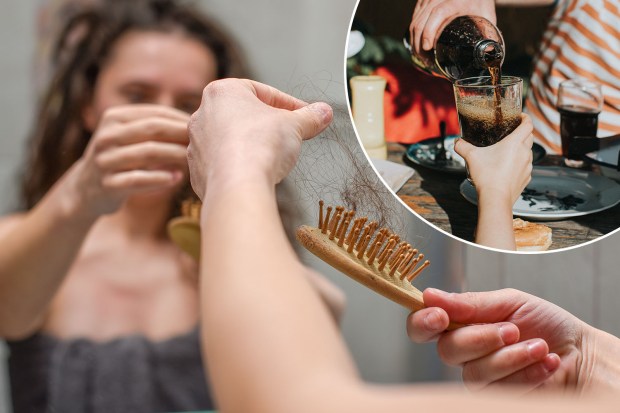Health
Study Links Sugary Drinks to Hair Loss, Suggests Nutritional Solutions

Research has identified a concerning connection between the consumption of sugary drinks and the risk of hair loss. An international team of researchers reviewed data from 17 studies involving more than 61,000 participants, suggesting that dietary choices significantly impact hair health. The findings were published in the journal Nutrition and Health.
The analysis indicated that men who consume over 3.5 litres of sugary beverages per week are at a heightened risk of experiencing baldness. Additionally, excessive alcohol intake was also associated with thinning and greying hair. Experts emphasized that these results highlight the critical role that nutrition plays in maintaining healthy hair, warning that poor dietary habits could contribute to conditions like alopecia, which is an autoimmune disease affecting hair follicles.
One notable aspect of the research was the correlation found between low levels of vitamin D and increased severity of baldness. Vitamin D, which is synthesized by the body upon exposure to sunlight, is crucial for various bodily functions, including hair growth. In contrast, women who took iron supplements showed improved hair growth, with Tesco Health Iron 14mg tablets priced at approximately £2.45 for a pack, suggesting a cost-effective option for those seeking to enhance their hair health.
Additional findings from the review noted that specific supplements could yield positive effects on hair condition. For example, trials suggested that extracts from green tea might help reduce hair shedding, while persimmon leaf extract was linked to increased strand thickness. A clinical study demonstrated that dietary changes could have rapid effects on hair, with men on a very low-protein diet developing thinner, less pigmented hair bulbs within just two weeks.
While many nutrients showed promise, not all had beneficial effects. A study conducted in Japan revealed that excessive doses of vitamin A could potentially worsen alopecia symptoms. The authors of the review pointed out that hair loss is not merely a cosmetic issue; rather, it is closely tied to individual identity, self-esteem, and psychological well-being.
Current scientific evidence suggests that maintaining adequate levels of essential nutrients, particularly vitamin D and iron, can be an effective strategy for preventing and managing alopecia. Furthermore, limiting the intake of alcohol and sugary drinks may offer additional protection against hair loss.
Baldness is a prevalent concern that affects millions globally, and with increasing demand for effective treatments, the researchers emphasized the necessity for further investigations into the links between diet and hair health. They underscored that dietary choices could determine the difference between retaining or losing hair.
For individuals experiencing hair loss, various treatment options exist, although many may not be covered by healthcare services. Common treatments for male pattern baldness include finasteride and minoxidil. While some wigs are accessible through the NHS, others may require out-of-pocket expenses unless individuals qualify for financial assistance. Alternative treatment methods encompass steroid injections, immunotherapy, light therapy, tattooing, hair transplants, and scalp reduction surgery.
As research continues to evolve, understanding the relationship between diet and hair health may pave the way for more effective prevention and management strategies.
-

 World2 months ago
World2 months agoCoronation Street’s Shocking Murder Twist Reveals Family Secrets
-

 Entertainment2 months ago
Entertainment2 months agoAndrew Pierce Confirms Departure from ITV’s Good Morning Britain
-

 Health5 months ago
Health5 months agoKatie Price Faces New Health Concerns After Cancer Symptoms Resurface
-

 Health2 weeks ago
Health2 weeks agoSue Radford Reveals Weight Loss Journey, Shedding 12–13 kg
-

 Entertainment6 months ago
Entertainment6 months agoKate Garraway Sells £2 Million Home Amid Financial Struggles
-

 Entertainment5 months ago
Entertainment5 months agoAnn Ming Reflects on ITV’s ‘I Fought the Law’ Drama
-

 World3 months ago
World3 months agoBailey Announces Heartbreaking Split from Rebecca After Reunion
-

 Entertainment2 months ago
Entertainment2 months agoDavid Jason and Nicholas Lyndhurst Eye Reunion for Only Fools Anniversary
-

 Entertainment3 months ago
Entertainment3 months agoCoronation Street Fans React as Todd Faces Heartbreaking Choice
-

 World3 months ago
World3 months agoEastEnders’ Nicola Mitchell Faces Unexpected Pregnancy Crisis
-

 Entertainment2 months ago
Entertainment2 months agoBradley Walsh Sparks Strictly Come Dancing Hosting Speculation
-

 Entertainment2 months ago
Entertainment2 months agoTwo Stars Evicted from I’m A Celebrity Just Days Before Finale











